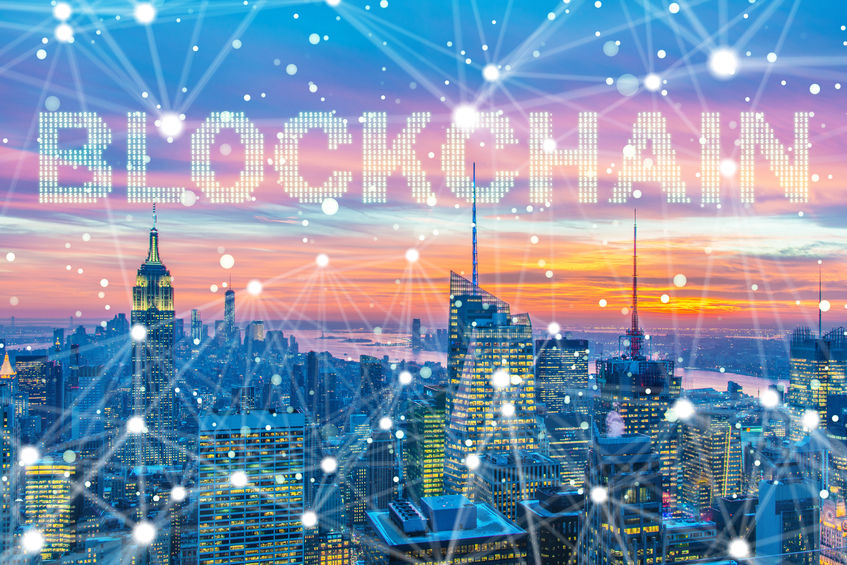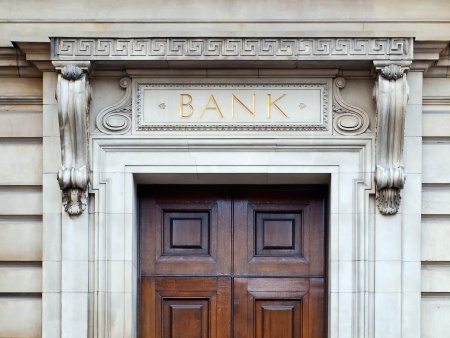Fintech
Signature Bank Partners with trueDigital
December 4, 2018 Today, Signature Bank unveiled a proprietary digital payments platform for its commercial clients, according to a statement released by the bank. The platform, called Signet, is designed to allow Signature Bank’s commercial clients to make real-time payments in U.S. dollars, every hour of the year.
Today, Signature Bank unveiled a proprietary digital payments platform for its commercial clients, according to a statement released by the bank. The platform, called Signet, is designed to allow Signature Bank’s commercial clients to make real-time payments in U.S. dollars, every hour of the year.
“The ability to transmit funds between approved, fully vetted commercial clients of the bank at all times is very valuable, especially in light of the increasing speed and frequency at which they conduct their business,” said Joseph J. DePaolo, President and Chief Executive Officer at Signature Bank. “Signature Bank has made a commitment to invest in its technology infrastructure, and the Signet Platform is indicative of this investment,”
This commitment by a bank to embrace technology is consistent with other banks of late. Chase and PNC have partnered with OnDeck’s ODX to streamline their online lending processes and other banks have partnered with fintechs recently as well.
“The partnership between trueDigital and Signature Bank will quickly prove to be extremely beneficial and revolutionary for clients globally as they will now be afforded the opportunity to make instantaneous USD payments to one another in real-time at no cost per transaction,” said Sunil Hirani, Founder of trueDigital.
The new Signet platform uses blockchain technology and can be used to make payments across a wide variety of industries, initially focusing on power, shipping, real estate, auto and digital assets where costs, delays, operational risks and counter-party risks are significant, according to a trueDigital statement.
The platform is not designed for a very small company as transactions made on the Signet platform require a minimum account balance of $250,000. Also, the companies exchanging money must both have an account at Signature Bank.
The New York State Department of Financial Services has approved the Signet platform and deposits held on the platform are eligible for FDIC insurance, up to the legal insurable amounts defined by the FDIC.
Signature Bank is a New York-based full-service commercial bank with 30 private client offices throughout the New York metropolitan area. This year, the bank opened a full-service private client banking office in San Francisco. Signature Bank’s specialty finance subsidiary, Signature Financial, LLC, provides equipment finance and leasing. trueDigital is a New York-based fintech company that provides solutions to financial markets by utilizing blockchain-based technologies.
SoFi CEO Reiterates Company’s Low Appetite for Risk
December 3, 2018 In an interview late last week on Jim Cramer’s “Mad Money” TV show, SoFi CEO Anthony Noto said that when he took over as CEO in March, his number one priority was focusing on “quality of loans over quantity.”
In an interview late last week on Jim Cramer’s “Mad Money” TV show, SoFi CEO Anthony Noto said that when he took over as CEO in March, his number one priority was focusing on “quality of loans over quantity.”
“We have really strong risk controls,” Noto told Cramer. “Knowing that the [changed] interest rate was coming, we wanted to focus on per-loan economics for two reasons: one, we wanted the loans that we created to be great investments for our asset-backed security investors, but also if we keep them on our balance sheet.”
SoFi started out offering college loans and has since developed a wide product offering, including mortgages, personal loans, wealth management and a product designed for parents paying for their children’s education.
During an interview in October at Money 20/20, Noto told the audience that he was accepted to Ivy League colleges, but didn’t take out any loans because he was uncertain if he could afford to pay them back. Instead, because of his academic and sports accomplishments, he was recruited to West Point, the elite U.S. military academy where he attended for free.
SoFi’s typical customer has an average FICO score of 720, Noto said at Money 20/20.
“Higher interest rates have made our underwriting more conservative,” he said.
He also said at Money 20/20 that he believes SoFi ought to eventually open some physical locations, like ATMs, for people who get paid in cash. Additionally, the release of a digital currency product is likely on the horizon in 2019, Noto said.
Earlier last week, Cramer pointed to some non-bank lenders, like Quicken Loans, as posing a risk to the broader economy. But he was supportive of SoFi, telling Noto that he signed up for a SoFi account in 10 seconds.
“It was quick and easy, which is just what [millennials] want,” Cramer said.
Numerated to Improve Online Lending for Regional Banks
November 30, 2018 On Wednesday, Numerated announced that it had closed $8 million in financing, bringing its total to $17 million. Numerated is a platform that helps banks make automated credit and lending decisions.
On Wednesday, Numerated announced that it had closed $8 million in financing, bringing its total to $17 million. Numerated is a platform that helps banks make automated credit and lending decisions.
“We’ve seen a tipping point in the market, with banks across the U.S. focused on digitally serving their business segments and out-competing national and global lenders,” said Numerated founder and CEO Dan O’Malley. “And we look forward to continuing to develop a platform that drives real growth for them.”
Like the recently launched ODX, which grew out of OnDeck’s success helping Chase with online lending, Numerated was first developed in 2015 by Eastern Bank to improve its online lending capabilities. In 2017, it was spun out as an independent company by O’Malley, who had been Chief Digital Officer at Boston-headquartered Eastern Bank.
A new investor who contributed to Numerated’s latest round is Raj Date, the founding Deputy Director of the Consumer Financial Protection Bureau (CFPB) and the current Managing Director at Fenway Summer Ventures. Date will also join Numerated’s Advisory Board.
“The industry has been sorely lacking a solution designed specifically for community and regional banks to compete and win against giant global banks and alternative lenders in business banking,” Date said. “Numerated has quickly grown to become the market leader in business lending with its real-time fintech platform, and I look forward to advising the company as it continues its growth.”
While OnDeck’s ODX and Numerated have similar offerings and objectives – to help banks become faster and more competitive online lenders – Numerated’s focus seems to be on servicing smaller regional banks. Some of its clients, according to its website, include Seacoast Bank, Franklin Synergy Bank, Eastern Bank and MidFirst bank.
Meanwhile, ODX services Chase and it announced in October that its first client as an independent entity was PNC Bank.
“We’re looking at the top 200 banks first,” OnDeck CEO Noah Breslow told deBanked in October.
Numerated was launched in 2017 by O’Malley and is based in Boston.
SoFi Has Another Loss in Q3
November 12, 2018According to the WSJ, SoFi experienced a $12 million EBITDA loss in the 3rd quarter. That follows a $150 million loss in Q2.
“We optimized for investing over profitability this quarter, and expect this to continue given the opportunity in front of us,” SoFi CEO Anthony Noto wrote in a letter to shareholders obtained by the WSJ.
At Money2020 last month, Noto suggested that the company would eventually need to open physical locations to manage cash transactions.
As Implementation of FICO’s UltraFICO Approaches, Upstart Says The Value is There
November 5, 2018The rise of fintech has already rocked the banking and traditional lending industry and now it’s disrupting FICO, the traditional credit scoring method that’s been in place since the mid-1900s.
FICO, which is the credit scoring system created by Fair Isaac Corp, is getting a makeover. The UltraFICO Score, which is scheduled to launch in early 2019, will pull from a consumer’s checking, savings and money-market accounts and add the data to their credit profile. It creates a broader credit picture, one that is designed to lead to more lending approvals than the static formula provides, as long as a consumer manages their cash well. Reports suggest the FICO score could jump by 20 points or more for millions of borrowers.
Meanwhile, fintech startup Upstart has been in the consumer lending business for the past five years. Upstart takes a two-pronged approaching, using more variables and more machine-learning algorithms than the traditional credit-scoring method.
“Using a variety of machine learning algorithms lets you pick up new insights from data,” said Upstart Co-Founder Paul Gu.
The company’s approach has influenced banks that frequently approach Upstart, a couple of which have become partners that are using a fully branded version of Upstart.com.

It’s not surprising considering Upstart is experiencing a lower loss rate versus its banking competitors. Upstart’s Gu explained the average lender issuing a personal loan to someone with a FICO score in the 660 range will typically experience a loss rate of 14%. Upstart’s loss rate is half that.
“That same 660-type borrower in our portfolio has an annual loss rate of 7%. That’s a pretty staggering difference and translates into benefits for our borrowers,” Gu told deBanked, adding that if the company can cut the loss rate, they can, in turn, lower the interest rate. Certainly, non-fintech lenders are paying attention.
“I don’t want to claim credit for anything FICO is thinking about. But I do think we are showing the industry at large that there is a huge amount of opportunity out there, and that you can go after it with technology that is available today. The potential benefits for consumers and your business are enormous,” Gu said.
Upstart’s early focus was on younger consumers with no real credit history but with an education history, which Gu said has yielded great success for the company. Since then they’ve expanded to pursue other groups of people who have similarly been “lost in the cracks” of the traditional credit scoring system, including certain occupations.
Gu explained that while lenders typically examine a potential borrower’s income level and their debt-to-income ratio, there’s more to it than that. Upstart most recently has created a way to include data based a potential borrower’s occupation, which he points out is tricky to quantify.
“Occupations are combinations of words that are hard to group in a useful way for the purposes of data analysis,” said Gu. Nonetheless, Upstart and its team of nearly a dozen data scientists have poured research into employers and occupations to create a classification system and determine how to turn words into numbers to use in their machine learning model.
“It’s not shocking that some professions are more highly correlated with repayment than others. Nurses, for example, are very reliable in paying back their loans,” Gu explained.
Upstart, which has issued consumer loans to fewer than 300,000 borrowers, has made it their mission to constantly improve upon their models to find cracks. “Our best estimate suggests we’ve solved only 8% of the total opportunity so far,” he said.
Low-Hanging Fruit
It’s early days for FICO’s new credit scoring system, but according to reports lenders have already begun to show an interest. Experian has reportedly partnered with fintech startup Finicity to publish the broader credit profile to banks. But the increased competition doesn’t seem to bother Upstart.
“I think there are starting to be efforts made by other players in the space to do some of the things we’re doing. Some of the lower hanging fruit we were uncompeted for earlier might have a little bit of competition. That said, the thing people don’t realize is how much room for improvement is still left,” Gu said.
As for FICO, their new feature is a side-product to the traditional credit-scoring system, not a replacement, which could impact the pace of adoption and innovation. “This kind of technology investment should take 95% of their attention, not 5%,” said Gu.
Elevate Tests ‘Geofencing’ to Lure Customers Away from Competition
November 1, 2018 During a session at Money 20/20 last week, Elevate CEO Ken Rees mentioned a fairly new marketing technique they have been testing called geofencing. According to a story in CIO, a trade publication for Chief Information / Chief Technology Officers, geofencing is “a service [using GPS technology] that triggers an action when a device enters a set location.” For Elevate, these set locations are payday loan stores and the idea is for the company to detect and then market to prospective customers who may have recently visited a payday loan store. People visiting such stores would likely be good candidates for Elevate’s Rise product.
During a session at Money 20/20 last week, Elevate CEO Ken Rees mentioned a fairly new marketing technique they have been testing called geofencing. According to a story in CIO, a trade publication for Chief Information / Chief Technology Officers, geofencing is “a service [using GPS technology] that triggers an action when a device enters a set location.” For Elevate, these set locations are payday loan stores and the idea is for the company to detect and then market to prospective customers who may have recently visited a payday loan store. People visiting such stores would likely be good candidates for Elevate’s Rise product.
“It can’t be a completely [random person,]” Elevate’s COO Jason Harvison told deBanked. He explained that the prospective customer had to have somehow engaged previously with Elevate, which could mean that they visited Elevate’s website.
Daniel Rhea, Elevate’s Senior Communications Manager, said that they don’t have the ability follow people. Instead, what they can do is tell when someone gets near one of their targets (payday loan stores) and then present them with ads. The mobile ads are not served immediately. Rhea said that ads could be served to someone who entered the target zone up to 90 days later.
“We’re not trying to get you at that exact moment,” Harvison told deBanked. “It’s not something that’s going to interfere with your transaction at a payday loan store, but it’s going to inform you that there is a better option out there.”

According the CIO article, retailers use geofencing to market to people who are in the vicinity of their stores. The technology is also being used for home convenience (to turn on a thermostat when someone arrives at their house) and for security (to alert a someone when others enter or leave their home or business).
Many of these uses of geofencing require that an app is downloaded to the user’s phone. Elevate system does not involve an app, but the individual’s location services on their phone must be turned on. So how can Elevate identify people within its target zones? As an example, Rhea said that if you use the public wifi at a Starbucks, Elevate can identify you. And he said that the same applies for when someone uses bluetooth.
“There’s a lot of people [using] this,” Rhea said. “Politicians are microtargeting around polling stations. It’s not that it’s uncommon. It might be uncommon in our space.”
Rhea said that this program, which started at the beginning of 2018, is still in a pilot phase, but that Elevate hopes to place geo-targets around every payday loan store in the country.
“[If you’re going to a payday loan store,] we want to try to entice you to not take out a product in a storefront and use a more consumer-friendly product that we take to market,” Harvison said.
Prime and Non-prime Lenders Exchange Notes
October 25, 2018 Ken Rees, CEO, Elevate
Ken Rees, CEO, ElevateAt Money 20/20 Ken Rees, CEO of Elevate, a non-prime consumer lender, sat down with David Kimball, CEO of Prosper, a prime consumer lender. As they discussed a number of topics, listeners got insight into how these lenders think, and how they think differently based on the customers they serve.
On Partnering with Banks
Rees said that he is eager to partner with banks and that banks have spoken to him about a gap they have – namely, the fact that they have thousands, if not millions, of checking account customers with low Fico scores for whom they have no other products to offer. Elevate has products for these banks’ non-prime customers.
“Banks have customers and we want to work with them,” Rees said.
Rees said that the very large banks may have the resources to develop new products on their own, but that there are thousands of mid-sized banks to partner with.
Kimball, who was CFO of USAA Federal Savings Bank, had some advice for fintechs on how to approach a potential partnership with a bank.
“Don’t go in thinking they’re stupid,” he said. “Assume that you have a really good partner.”
Furthermore, Kimball said that having worked at a bank during the recession, “when you break things, regulators aren’t so happy to work with you again.” By this, he meant that bankers may have very legitimate concerns about taking on risk by working with a fintech company.
Kimball continued, “You need a good champion at the right level [at a bank] to move you forward.”
 David Kimball, CEO, Prosper
David Kimball, CEO, ProsperOn a Looming Recession
Kimball said that Prosper is being more conservative with its underwriting now. On the other hand, Rees said that a recession doesn’t concern him as much.
“Our customers are always living in a recession,” Rees said.
On Speed vs. Rate
“For prime customers, it’s all about rate. For non-prime, it’s all about speed, how fast they can get the money,” Rees said.
On Marketing
Kimball said that direct marketing still works best to get new customers, while Rees mentioned a new geo-marketing tool that alerts Elevate when a potential customer approaches a payday lending shop. Someone visiting a payday lending shop would likely be a good customer for Elevate. Rees conceded that “this could be kind of creepy.” But it’s a new approach.
Heard at Money 20/20
October 24, 2018Shaquille O’Neal, Basketball legend and startup investor
O’Neal appeared at the conference on behalf of Steady, a startup he supports that helps people find work relevant to their skill set and location.
“I like being involved in companies that help people people,” O’Neal said. “With Steady, we want to help people gain income. It shouldn’t be hard to find work.”
When asked about other companies he involved with, he said, “I listed all the companies once and my mom said, ‘It sounds like you’re bragging, so cut it out.’ So I don’t talk about them anymore, because my mom’s out in there in the audience somewhere.”
Basketball Legend and Advisor & Advocate of @thesteadyapp, @SHAQ reveals his new nickname at the final of the Startup Pitch at #money2020 pic.twitter.com/ZhDGbCi9DN
— Money20/20 (@money2020) October 24, 2018
Rob Frohwein, Kabbage Co-founder
Frohwein said his company noticed that its customers were borrowing a little less money after they were issued Kabbage’s card.
“It was because customers were borrowing the exact amount they needed at the point of purchase.”
At first, Frohwein said they were concerned, but that ultimately “customers aren’t over-borrowing…and that’s excellent for customer loyalty.
Anthony Noto, SoFi CEO
Noto said he went to West Point for college, which was completely free for him. He said that he could have gotten student loans to attend other prestigious colleges, but he didn’t know if he could afford to pay it back.
With regard to how higher interest rates are affecting SoFi, he said, “higher interest rates have made our underwriting more conservative [and have forced us] to focus on quality.”
On the topic of potentially becoming an Industrial Loan Company (ILC) bank:
“An ILC could be in our future so that we have the same rates across all states we operate in…We are regulated and we’re comfortable with that.”





























